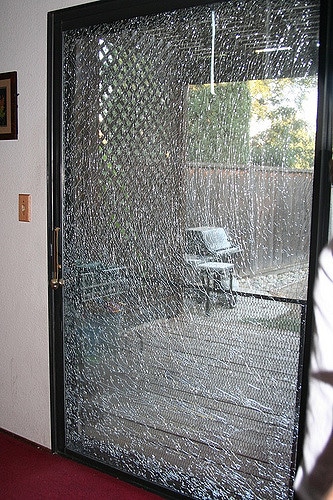Is it possible for glass explode spontaneously?
This is one of the most asked questions we get from people in the Real Estate Industry.
Spontaneous glass breakage is a phenomenon by which toughened glass may spontaneously break without any apparent reason.
The most common causes are:
Installation damage
While glass is being moved and installed, it is easy for the glaziers to nick or chip the edges of the glass.
It is also possible for fasteners such as nails used to attach glass stops to nick the glass edges.
These small nicks or chips may not result in immediate breakage.
However, over time, as the glass expands, stress concentrations can develop around the nick, leading to breakage.
In the case of tempered glass the entire unit usually breaks.
Binding in the frame
Glass expands and contracts with changes in temperature and deflects due to wind.
Because of this modern glass is set on resilient blocks at the bottom and with space for expansion at the sides and top.
The gaskets holding the glass in the frame are also usually resilient to cushion the glass against wind buffeting.
If no space is provided at the perimeter of the unit, the glass will bind against the frame
This will cause internal stresses to develop in the glass which can exceed the strength of glass, resulting in breakage.
Internal defects and inclusions in the glass
Nickel sulfide inclusions (“stones”) can be present in the glass.
The most common cause of these is the use of stainless-steel machinery in the glass making and handling process.
Small shavings of stainless steel containing nickel change structure over time and grow, creating internal stresses in the glass.
When these stresses exceed the strength of the glass, breakage results.
This type of breakage is almost always found in tempered glass and is indicated by a distinctive “figure eight” pattern.
Alternatively, small pieces of refractory brick can be eroded by the molten glass from the internal walls of the furnace during processing and become embedded in the finished glass.
These are also known as “stones”, and can also break the glass when the glass is heated, as they create thermal anomalies.
Thermal Stresses
Breakage due to thermal stress is most common in large pieces of sealed insulating glass with heavy heat-absorbing (reflective) coatings.
The coating is usually applied to the “number two” surface (the inside face of the outside lite).
This causes the outside lite of glass to heat up more than the inside lite as the coating converts radiant heat from the Sun into sensible heat.
As the outer lite expands due to heating, the entire unit bends outward. If the spacer bar or other edge condition connects the two lites of glass in a very rigid manner, bending stresses can develop which exceed the strength of the glass, causing breakage.
This was the cause of extensive glass breakage at the John Hancock Tower in Boston WHERE ALL 10,334 PANES OF GLASS HAD TO BE REPLACED
Inadequate glass thickness
A pane that is too large or thin, having not been properly engineered for wind loads on the site, can be broken by the wind.
So as you can see the answer to your question can glass just explode is a yes there a ways that this can happen.
But please be aware if you are a property manager, parent or landlord.
Unless there is clear evidence such as a brick at the scene we cannot accurately determine the cause.
True Blue Glass will not become involved in any disputes between the parties involved.





